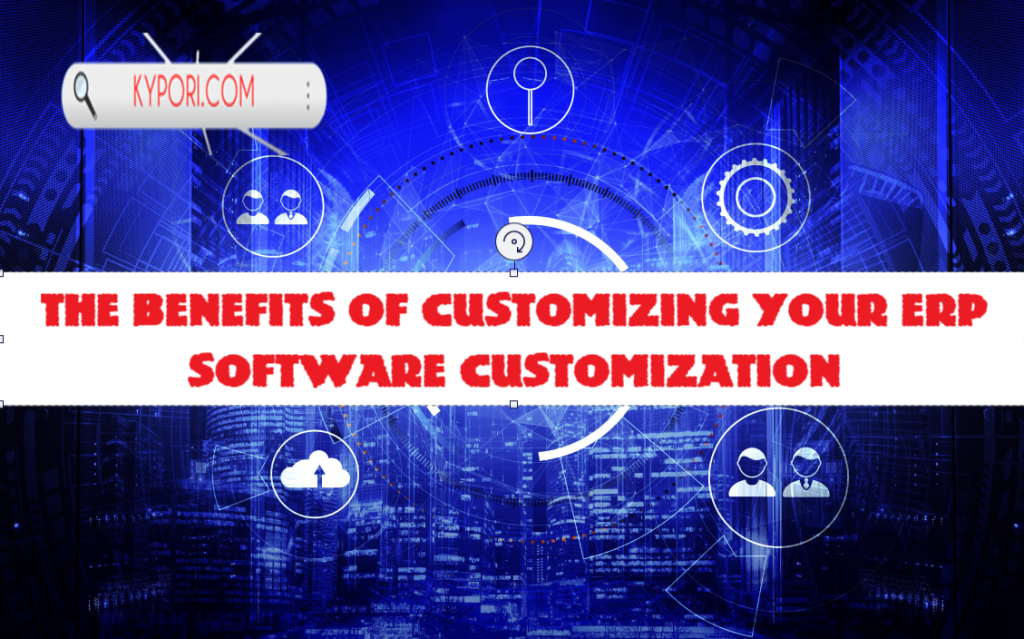In today’s rapidly evolving business landscape, ERP software customization has become a critical tool for organizations to streamline their operations and stay ahead of the competition. While selecting an out-of-the-box ERP solution may seem like an attractive option due to its easy implementation, organizations may miss out on the benefits of customization. Customizing an ERP software customization to meet the unique needs of a business can provide a significant competitive advantage. However, it’s essential to be aware of the advantages and disadvantages before embarking on customization.
Understanding ERP Software Customization

ERP software customization refers to modifying a pre-existing ERP system to meet the unique needs of a business. This process involves altering the software’s existing functionality or adding new features to it. Customization can range from minor changes, such as adding a new field or report, to significant modifications, such as building new modules or integrating with other software systems. The goal of customization is to optimize the ERP system for a business’s specific processes and workflows.
What is Customization in an ERP System?
ERP software customization refers to the process of modifying the software to meet the specific needs of a business. This can include adding new modules, changing the user interface, or altering the functionality of existing modules. While customization can help businesses get the most out of their ERP system, it also has several disadvantages.
The Pros of Customizing Your ERP Software

Tailored to Your Business Needs
One of the main advantages of customizing your ERP software is that it can be tailored to your organization’s specific business needs. By customizing the software, you can ensure that it meets all of your unique requirements and fits your company’s workflows.
Improved Efficiency and Productivity
Customizing your ERP software can also lead to improved efficiency and productivity. By streamlining processes and automating tasks, you can reduce the amount of time and resources required to complete them, freeing up staff to focus on other important tasks.
Competitive Advantage
Customizing your ERP software can also give your organization a competitive advantage in the market. By tailoring the software to your unique business needs, you can differentiate yourself from competitors and provide better customer service.
Sustainable Customizations
The ERP software customization platform from Nextworld enables Sustainable Customizations, guaranteeing that all of your customizations are securely kept and seamlessly included in all upcoming updates.
Increased User Adoption
ERP software customization can also lead to increased user adoption. By tailoring the software to meet the needs of your staff, you can increase their satisfaction with the software and reduce resistance to change.
Competitive Pricing
ERP software customization can be done by either using open-source platforms or by partnering with a vendor. In both cases, it allows for competitive pricing, which can be beneficial for small and medium-sized businesses that are looking for affordable ERP solutions.
Better User Experience
ERP software customization can also result in a better user experience for employees. By tailoring the system to meet their specific needs, users can enjoy a more intuitive and user-friendly interface.
Disadvantages of Customizing an ERP System

Impedes Implementation
ERP software customization systerms tend to take longer to implement than out-of-the-box solutions. This is because the customization process is complex and can require significant time and resources. Implementing a customized ERP system can also be more challenging because it may require changes to existing business processes or the adoption of new ones.
Costly
Customization can also be expensive. This is because the customization process can be time-consuming and may require the services of a specialized consultant or developer. Customization can also lead to higher maintenance and support costs over time.
Technical Debt
Technical debt refers to the costs that accrue over time as a result of implementing a customized ERP system. This can include higher maintenance costs, difficulty in upgrading the system, and reduced flexibility. Technical debt can also make it more difficult to integrate the ERP system with other software solutions, which can limit the system’s overall effectiveness.
Incompatibility with Future Upgrades
When a business customizes its ERP system, it runs the risk of creating incompatibilities with future upgrades or updates. This can result in a situation where the business is stuck with an outdated version of the software, which can limit its effectiveness and make it more difficult to stay competitive.
Reduces Ease of Use
Customization can also reduce the ease of use of an ERP system. This is because customization can lead to changes in the user interface or the functionality of the software, which can make it more difficult for employees to use the system effectively. This can lead to reduced productivity and increased.
Conclusion
In conclusion, while using a standard, out-of-the-box ERP system may be more convenient, customizing an ERP system can offer significant benefits for organizations, including a balance between integration and specification, the ability to meet specific needs, and user-friendly interfaces. However, it is essential for company leaders to be aware of the advantages and disadvantages of customization before making the decision to embark on it.

